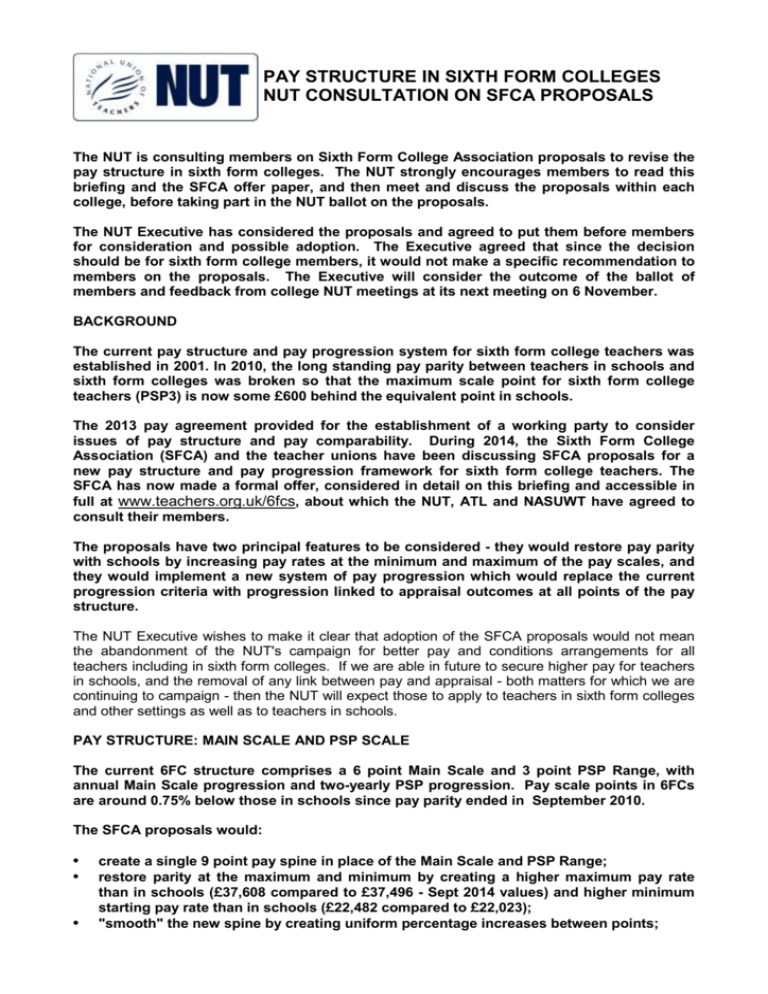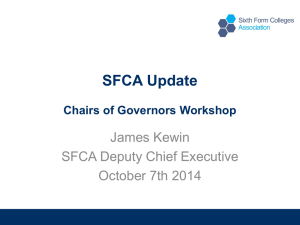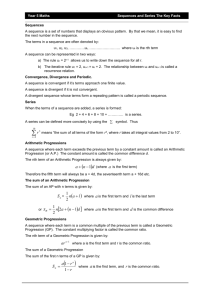PAY STRUCTURE IN SIXTH FORM COLLEGES NUT
advertisement

PAY STRUCTURE IN SIXTH FORM COLLEGES NUT CONSULTATION ON SFCA PROPOSALS The NUT is consulting members on Sixth Form College Association proposals to revise the pay structure in sixth form colleges. The NUT strongly encourages members to read this briefing and the SFCA offer paper, and then meet and discuss the proposals within each college, before taking part in the NUT ballot on the proposals. The NUT Executive has considered the proposals and agreed to put them before members for consideration and possible adoption. The Executive agreed that since the decision should be for sixth form college members, it would not make a specific recommendation to members on the proposals. The Executive will consider the outcome of the ballot of members and feedback from college NUT meetings at its next meeting on 6 November. BACKGROUND The current pay structure and pay progression system for sixth form college teachers was established in 2001. In 2010, the long standing pay parity between teachers in schools and sixth form colleges was broken so that the maximum scale point for sixth form college teachers (PSP3) is now some £600 behind the equivalent point in schools. The 2013 pay agreement provided for the establishment of a working party to consider issues of pay structure and pay comparability. During 2014, the Sixth Form College Association (SFCA) and the teacher unions have been discussing SFCA proposals for a new pay structure and pay progression framework for sixth form college teachers. The SFCA has now made a formal offer, considered in detail on this briefing and accessible in full at www.teachers.org.uk/6fcs, about which the NUT, ATL and NASUWT have agreed to consult their members. The proposals have two principal features to be considered - they would restore pay parity with schools by increasing pay rates at the minimum and maximum of the pay scales, and they would implement a new system of pay progression which would replace the current progression criteria with progression linked to appraisal outcomes at all points of the pay structure. The NUT Executive wishes to make it clear that adoption of the SFCA proposals would not mean the abandonment of the NUT's campaign for better pay and conditions arrangements for all teachers including in sixth form colleges. If we are able in future to secure higher pay for teachers in schools, and the removal of any link between pay and appraisal - both matters for which we are continuing to campaign - then the NUT will expect those to apply to teachers in sixth form colleges and other settings as well as to teachers in schools. PAY STRUCTURE: MAIN SCALE AND PSP SCALE The current 6FC structure comprises a 6 point Main Scale and 3 point PSP Range, with annual Main Scale progression and two-yearly PSP progression. Pay scale points in 6FCs are around 0.75% below those in schools since pay parity ended in September 2010. The SFCA proposals would: • • • create a single 9 point pay spine in place of the Main Scale and PSP Range; restore parity at the maximum and minimum by creating a higher maximum pay rate than in schools (£37,608 compared to £37,496 - Sept 2014 values) and higher minimum starting pay rate than in schools (£22,482 compared to £22,023); "smooth" the new spine by creating uniform percentage increases between points; • • retain fixed pay points and pay portability; and introduce annual progression at all points on the pay scale, allowing teachers the prospect of reaching the top of the pay scale earlier than now. Comments The proposal would restore pay parity with schools at the scale minimum and maximum. In fact these points would be higher than the corresponding pay rates in schools. In between, the smoothing of the spine would mean that some points would be slightly higher than now and some points lower than now. The proposal also retains fixed scale points, which have now been removed in schools, and introduced the prospect of annual pay progression at all points of the scale in place of two-yearly progression on the PSP Range. There is no proposal to remove pay portability (the right to continue to be paid at least at the same pay point for experience when moving colleges) unlike in schools where teachers moving between schools are no longer entitled to be paid at the same point or keep their post-threshold (PSP equivalent) status. Total pay earned under the current 6FC structure while progressing from point 1 to point PSP3 is £335,000 compared to £340,000 in schools (September 2014 values). The proposals would mean 6FC teachers reaching the maximum would earn £340,000 over this period as in schools. Each year thereafter, they would earn slightly more than in schools and £600 more than under the current 6FC structure. Although the SFCA has aimed as far as possible for a cost neutral structure, the proposed structure could, in the longer term, pay 6FC teachers noticeably more than now due to the higher scale maximum. The proposals do not involve any change to London allowances. For many years, the 6FC pay structure has provided levels of London allowance lower than those in schools. The NUT will consult London 6FC members separately about London allowances in early 2015. PAY PROGRESSION The current 6FC structure provides for annual experience-based progression on the Main Scale; and for two-yearly progression on the PSP Range related to classroom observation and student results and based on an application system. The student results criterion requires teachers to identify two teaching groups which at least meet a national median value-added statistical measure. The SFCA proposals would: • • • • • remove the existing provisions and establish a general provision that pay progression should follow “acceptable appraisal outcomes”; provide, subject to this, for specific progression criteria to be agreed within colleges; provide for national benchmarks on value-added data to be published annually to assist judgements but without a national requirement to meet the median; introduce an amended version of the Teachers’ Standards for school teachers in place of the current PSP Standards for sixth form college teachers; and provide for automatic reviews, so that teachers do not need to apply for pay progression as now. Comments Progression on the PSP Range and the Management Ranges is currently based on performance against three specific measures - classroom observation outcomes, student achievement as measured by exam results for two specified teaching groups, and student retention data. Progression on the Main Scale is currently experience-based and can be withheld on the basis of unsatisfactory performance. The proposal would mirror recent changes in schools, requiring progression decisions to be linked to appraisal outcomes at all points on the scale. The teacher unions have, however, sought to ensure that a range of safeguards are implemented in order to ensure that criteria established for progression are fair and appropriate and that present rates of progression are not affected by the establishment of new progression provisions. The SFCA has agreed that the general requirement for pay progression should be that teachers’ overall performance is judged to be “acceptable or better”. The choice of the term “acceptable” is intended to avoid a perception that the required standards for progression are higher than now. The SFCA has confirmed, in its covering letter accompanying the proposals (see www.teachers.org.uk/6fcs) that the proposal is not intended to lead to reduced rates of progression. The SFCA’s offer paper states that its intention in making the proposals is to allow pay progression to be linked to performance measures appropriate to the circumstances of the college and the teacher; and ensure that pay progression and appraisal processes “support” college improvement processes and avoid criticism that they do not relate to each other. Existing standards in the sector have led to high rates of pay progression which the teacher unions wish to maintain under any revised progression system. The NUT Executive wishes to make it absolutely clear that the NUT will support 6FC representatives and members in opposing any attempt on the part of colleges to put in place practices which would reduce rates of pay progression, under the current system as well as under any revised system. The SFCA proposal would remove the specific link to classroom observations and retention and to meeting a national median for student achievement irrespective of circumstances. Given that many colleges will wish to continue to relate decisions to student outcomes, the SFCA proposes to develop annual sector-wide benchmarks in conjunction with ALPs, ALIS etc to ensure consistency. The proposal also specifies that “the assumption will be that teachers are working to the required standard unless demonstrated otherwise” and that problems should be identified during the appraisal cycle, with teachers given support and time to address problems prior to any pay decision, not identified only at the conclusion of the cycle. This provision has been a key objective for the NUT in negotiating acceptable pay policies for schools over the past two years. The SFCA proposes the introduction of the schools’ Teachers’ Standards in place of the PSP Standards introduced in 2000 but envisages retaining the current 6FC Management Standards as an additional factor in progression decisions for teachers who hold responsibility payments. During discussions, the NUT and other teacher unions have secured the removal of the present specific reference to classroom observation judgements and retention data. We have also secured the removal of a proposed “career stage expectations” matrix. In agreeing to this, the SFCA has said it does not want a bureaucratic approach to appraisal and pay decisions and will discuss further guidance on that area to avoid issues of that kind arising. We have also secured agreement to annual pay progression as opposed to biennial progression on the top three points, and to the removal of the present application requirement for an application before teachers are considered for pay progression on the PSP Range. PAY STRUCTURE: RESPONSIBILITY PAYMENTS The current 6FC "promoted post" structure comprises five Management Ranges (A to E) with a three point progression range for every teacher. The SFCA proposals would: • introduce a system of Responsibility Allowances, similar to TLR payments in schools, in place of the separate Management Ranges; • • allow such payments to be spot payments or alternatively range payments requiring progression to the maximum value of allowance; introduce a Leadership Spine, extending to £81,847, for senior posts below Principal and Deputy / Vice Principal, possibly including current D & E range posts. Comments The proposed RA band runs from £1000 to £10,000. It is intended to cover existing the A, B, C and D ranges. Teachers currently paid on the E range - and potentially some teachers paid on the D range - would move to the new Leadership spine. Colleges would determine the level of future responsibility payments according to the duties of the post. Teachers currently paid on the Management Ranges would be protected at their existing pay level via the assimilation provisions. Teachers might be paid RAs as “spot payments” or be appointed to a payment range offering progression in post (but linked to appraisal) as with the existing Management Ranges. The current Management Range differentials (ie difference in value between PSP3 and point 3 on the ranges) are as follows: A £2479; B £4217; C £7329; D £9591; E £12647. The SFCA justifies the proposed lower level of RA by pointing to the fact that many colleges currently pay “off scale” payments at this level - payments currently made outside the scope of the national structure to around 900 teachers would now come within that structure. Teachers would continue to be entitled to additional payment for additional days of work unless employed on the Leadership Spine. The Leadership Spine, extending beyond £80,000, would bring within the national agreement many assistant principal posts currently outside the scope of that agreement. Such teachers would (like leadership group teachers in schools) not be covered by the working time limit of 1265 hours and 190/195 days. Contracts would, however, be expected to specify a limit on working days eg up to 10 days’ additional working time. The Leadership spine would include all E range posts and could also include D range posts. TRANSITION / ASSIMILATION Teachers who would otherwise suffer a loss through the implementation of the new structure (ie those on pay points in the middle of the spine which would reduce in value in the new structure) would be fully protected if remaining on that pay point. The national joint recommendation would be that teachers who would gain through the new structure should move immediately to their new higher pay point. The SFCA proposes, however, that individual colleges facing financial difficulty in affording this might propose that such teachers might have that increase phased for a period of up to two years at maximum. TIMETABLE The teacher unions and the SFCA have agreed to work towards the following timetable for considering the proposals: • • • • • Formal offer agreed by the SFCA Council on 1 October; Unions’ Executives to consider proposal in early October; Subject to Executives’ agreement, unions to consult members as they see appropriate during October; Unions’ Executives to consider matters further in early November; and SFCA AGM to consider the unions’ response on 17 November. National Union of Teachers Pay, Conditions and Bargaining October 2014


